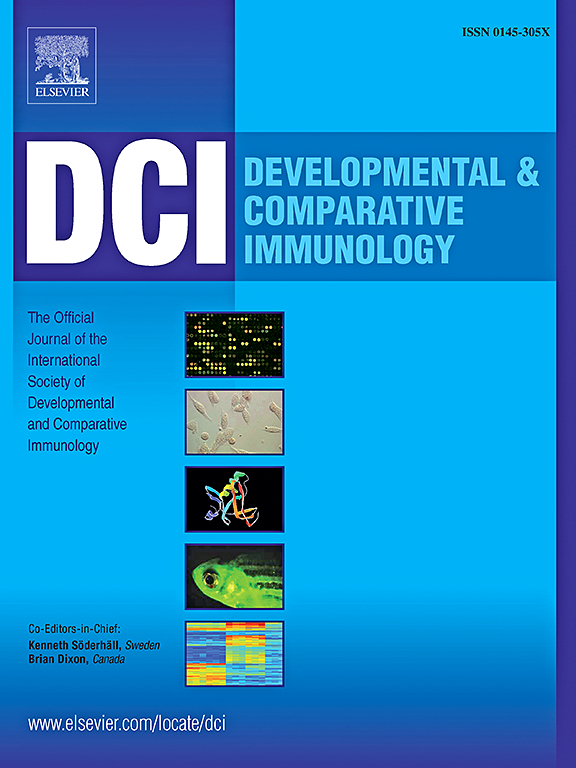Myd88 functions as a negative regulator of IRF11-mediated IFN production in teleosts
IF 2.7
3区 农林科学
Q1 FISHERIES
引用次数: 0
Abstract
MyD88 is an intracellular adaptor protein that mediates signals from many TLRs and IL-1/IL-18 receptors to downstream kinases, by recruiting transcription factors, such as IFN regulatory factor (IRF) family members, to evoke the activation of a series of target genes. Recent studies imply a role of MyD88 in the regulation of type IFN signaling through MyD88-IRF interaction in teleosts. In this study, we explore the mechanistic role of MyD88 on IFN production mediated by IRF11, a fish-specific positive regulator in this pathway. Overexpression of MyD88 suppressed IRF11-induced activation of the IFN promoter. Conversely, MyD88 knockdown in zebrafish liver cells further increased IRF11-induced expression of IFN and IFN-stimulated genes (ISGs). Co-immunoprecipitation experiments identified the Toll/IL-1 receptor (TIR) domain of MyD88 and the region between amino acids 114 and 155 of IRF11 as critical for their interaction. Confocal microscopy and subcellular fractionation revealed that MyD88 co-localizes with IRF11 in the nucleus upon co-expression. These results suggest MyD88 negatively regulates IRF11-mediated IFN production through protein-protein interaction and nuclear co-localization. Thus our present study places MyD88 as negative regulator participating in IRF11-mediated IFN production and provides a novel mechanism for regulating the fish antiviral response.
Myd88在硬鱼中作为irf11介导的IFN产生的负调节因子
MyD88是一种细胞内接头蛋白,通过募集转录因子,如IFN调节因子(IRF)家族成员,介导来自许多tlr和IL-1/IL-18受体的下游激酶的信号,从而激活一系列靶基因。最近的研究表明,MyD88在硬骨鱼中通过MyD88- irf相互作用调节IFN型信号传导。在这项研究中,我们探索了MyD88在IRF11介导的IFN产生中的机制作用,IRF11是鱼类特异性的正调节因子。MyD88的过表达抑制irf11诱导的IFN启动子的激活。相反,斑马鱼肝细胞MyD88敲低进一步增加irf11诱导的IFN和IFN刺激基因(ISGs)的表达。共免疫沉淀实验发现MyD88的Toll/IL-1受体(TIR)结构域和IRF11的114和155氨基酸之间的区域对它们的相互作用至关重要。共聚焦显微镜和亚细胞分离显示MyD88在细胞核中与IRF11共表达。这些结果表明MyD88通过蛋白相互作用和核共定位负调控irf11介导的IFN产生。因此,我们目前的研究将MyD88作为负调控因子参与irf11介导的IFN产生,并提供了一种调节鱼类抗病毒反应的新机制。
本文章由计算机程序翻译,如有差异,请以英文原文为准。
求助全文
约1分钟内获得全文
求助全文
来源期刊
CiteScore
6.20
自引率
6.90%
发文量
206
审稿时长
49 days
期刊介绍:
Developmental and Comparative Immunology (DCI) is an international journal that publishes articles describing original research in all areas of immunology, including comparative aspects of immunity and the evolution and development of the immune system. Manuscripts describing studies of immune systems in both vertebrates and invertebrates are welcome. All levels of immunological investigations are appropriate: organismal, cellular, biochemical and molecular genetics, extending to such fields as aging of the immune system, interaction between the immune and neuroendocrine system and intestinal immunity.

 求助内容:
求助内容: 应助结果提醒方式:
应助结果提醒方式:


